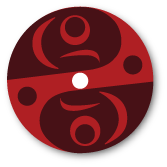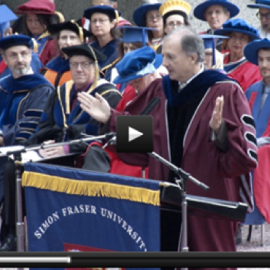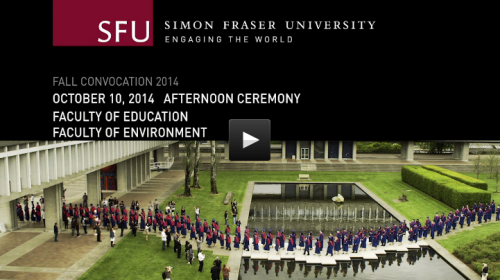I am honored to have the opportunity to speak this afternoon here on unceded Coast Salish land. For you the graduates, this event marks what anthropologists refer to as a rite of passage, a change from one stage of life to another. An important transition marked by new status; a transformation flowing from new knowledge.
My own life has been measured by a series of such transformations.
When I was eight years old I announced at the dinner table that I was going to become an archaeologist. And when I graduated with my Bachelor’s Degree (wearing the same tie I wear today), I was on the path to a traditional career within the academy, investigating the fragmentary remains of ancient lives in pursuit of scientific understanding.
While I did indeed end up as a professor of archaeology, my career has been quite different then what I anticipated as a young graduate.
For over 20 years now, I’ve collaborated closely with indigenous peoples throughout Canada and elsewhere in the world doing archaeology and heritage research in ways that benefit them directly. This means working in the often complex but always illuminating intersection of Indigenous and Western cultural values and knowledge systems. This has also been a rite of passage that has transformed my own understanding of the world, past and present.
Today I share four things I’ve learned in the process that may be of value, regardless of your career path. These concern privilege, humility, respect, and responsibility.
PRIVILEGE — I was very fortunate to spend 15 years on SFU’s campus on the Kamloops Indian Reserve. Many of the First Nations students enrolled there were the first in their family, sometimes their community, to seek a post-secondary degree. Some were older students; some single parents, and a good number former residential school students. Despite often substantial challenges, the majority persevered and the look of pride when they received certificates and degrees was unforgettable.
For many here, university is simply a step after high school. But we must remember that university education — or education at any level — is very much a privilege, one that we should not take for granted.
HUMILITY — In all endeavors, academic or otherwise, it is important to acknowledge that we seldom know as much as we think we know. One of the most important lessons I’ve learned in doing community-based research is thus to be humble. As many of my colleagues and I have discovered, the real cultural experts are the community members, not outside researchers.
In that same vein, I once overheard an elder say, “you can’t listen when your mouth is moving.” What she meant is that it is often only by listening that we can really understand what we seek to know.
RESPECT — One of the most important things a university education should promote is respect for different ways of knowing and appreciating the world. In Western society our views are often only validated by the methods of Science. But people in other cultures have other ways of knowing, other conceptions of the world.
In archaeology, for example, some are skeptical about the reliability of indigenous oral histories. But if the folks who recently discovered the lost Franklin Expedition ships in the Arctic had listened to the Inuit — who always knew where those ships were — they would have been found a long time ago, and saved millions of dollars of search costs.
We should always respect diverse ways of knowing and understanding the world, even if they are very different from our own.
And finally
RESPONSIBILITY — Knowledge comes with responsibilities. For archaeologists like myself, our careers are built upon other people’s heritage. We need to ensure that the information obtained is always used in respectful ways, and that we bring value to the communities with whom we work.
But we also have a responsibility to do something with what is learned. As Wang Yangming, the 16th-century philosopher stated, “Knowledge without action is not real knowledge.” What this means is that each of us has an obligation to use what we learn in ways that benefit others.
*
The advice I share comes from my experiences as an archaeologist and anthropologist, but I hope it resonates with the challenges and opportunities you may face, whether in environmental research, education, or other fields.
So tonight, celebrate your accomplishments as if you were Indiana Jones.
But as you move forward in your careers — and in life — what I ask you to remember is this: Be respectful, be responsible, be humble, and listen very, very carefully.
At Simon Fraser University, when an honorary degree is not being awarded, a faculty member is selected by the President’s Office to give the convocation address. For the recent Fall Faculty of the Environment/Faculty of Education convocation (Oct 10, 2014), this honor went to George Nicholas.
Click the image below to watch the video (George's address starts at 30:00).







